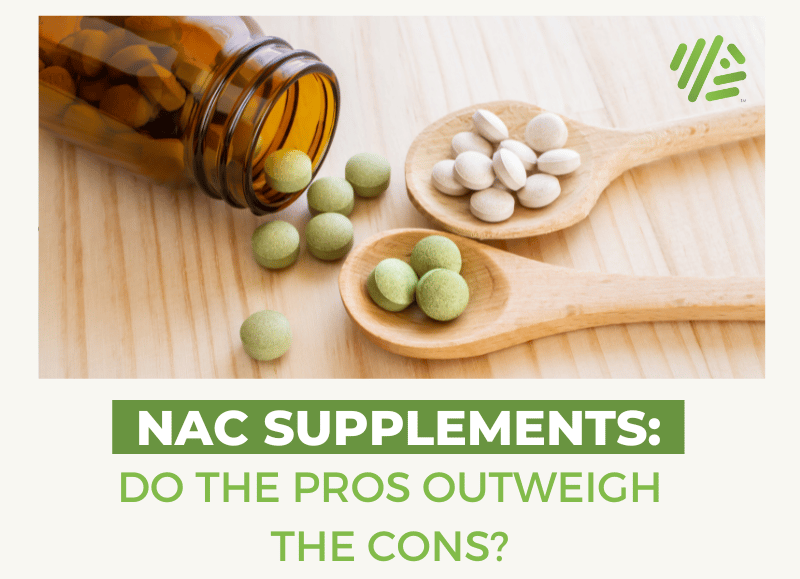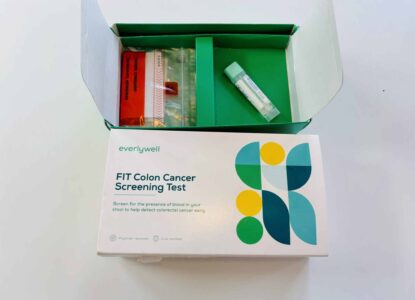NAC Supplements: Do the Pros Outweigh the Cons?
Genes Mentioned

N-Acetylcysteine, or NAC for short, is an antioxidant supplement that has been banned by Amazon after the FDA issues warnings to a number of brands marketing the drug as a hangover cure.
NAC has been used as a drug and a supplement, and the FDA reacted to what it considered overly aggressive marketing from hangover supplement brands that claimed NAC could treat conditions it hadn’t been approved for by regulatory bodies.
In this post, we will discuss 4 potential benefits of NAC supplements as well as side effects.
NAC supplement potential benefits
#1. NAC and glutathione production
NAC is one of a handful of dietary supplements that is also used quite frequently in hospital settings.
When a patient comes to the hospital with an acetaminophen overdose, standard of care is to use intravenous NAC to protect the liver and help the body excrete accumulated toxins. 1 This is one of NAC’s primary benefits – the ability to replenish levels of glutathione (one of the body’s most important antioxidants) in the liver after depletion.
When we take acetaminophen, a metabolite called NAPQI is produced, which in high enough doses is very toxic to the liver.1 Under normal circumstances, one of the body’s most important “endogenous” antioxidants, glutathione, cleans up the overdose before any lasting harm can be done. However, when mega doses of acetaminophen are taken, hepatic glutathione stores (glutathione in the liver) run out and the body doesn’t have enough to detoxify the bad stuff the acetaminophen produces.
The result can be liver damage and, if enough is taken, death.
NAC is a glutathione precursor and proven nutrient for restoring depleted glutathione levels. A double blind, placebo control study showed a 28% reduction in mortality when IV NAC was administered after an acetaminophen overdose. 2
#2. NAC may improve mood
NAC’s mood boosting effect has been demonstrated in clinical studies.
Double blind, placebo controlled studies have shown promise for the ability of NAC to help alleviate depressive disorders. In fact, while not all the studies have shown efficacy, I was particularly impressed by this meta analysis of 5 studies which found NAC has value in treating depression. 3
Keep in mind that the meta analysis started with 38 studies and had to throw out 33 of them for failure to meet “inclusion criteria.” Nevertheless, Psychology Today has also done a nice job highlighting the potential for NAC to help alleviate some mood disorders.
The likely mechanism here is NAC appears to work as a glutamate antagonist. 4
For those of you who have regularly read the blog, you’ll remember glutamate is the “gas pedal” neurotransmitter, which is great, unless pressing on the gas has you accelerating through a brick wall. An excess of glutamate can lead to anxiety, as well as excitotoxicity, which some theorize is the cause of many neurodegenerative disorders. 56
Another calming amino acid, L-theanine, is also a glutamate antagonist.
NAC is actually quite popular in the field of psychiatry and medical literature documents NAC experiments to treat everything from OCD, to addiction, to Bipolar disorder. 4
#3. May reduce prevent addiction relapse
Some studies have looked at NAC’s ability to help in the addiction recovery and healing process. In one study, 7 administering a 2,400 mg dose of NAC (a very high dose) to patients suffering from cocaine addiction normalized glutamate levels, which study authors credited for a reduction in impulsivity that could lead to further drug use.
Interestingly, healthy controls saw no difference in their glutamate levels. Since elevated glutamate levels are linked to relapse, study authors were encouraged by the findings.
#4. NAC and the lungs
NAC is an anti-mucous agent, and many people take it for conditions like COPD, which involves the unpleasant build up of mucus in the lungs. 9
A study in mice found that NAC supplements could accelerate tumor growth in the lungs. The takeaway for the authors was that NAC could actually be dangerous in high risk populations, such as those struggling with COPD.10
NAC and sulfur amino acids
I’ve written before about the CBS family of genes and how certain SNPs in those pathways can affect sulfur metabolism. One SNP, CBS C699T, is associated with an up-regulation of sulfur metabolism.
What does this have to do with NAC?
NAC, alpha lipoic acid, and glutathione are all “sulfur donor supplements,” meaning their building blocks are sulfur containing amino acids, which in the case of NAC is Cysteine.11
In some sensitive individuals this could mean they are best advised to avoid sulfur donor supplements like NAC.




After talking with out pediatrician, she recommended NAC, specifically PharmaNAC. I researched it and realize it is an effervescent tablet, basically NAC with sodium bicarbonate. So, a gentler and more instantly bioavailability form, as it is not acidic anymore. So, taking NAC with a small amount of sodium bicarbonate in water, and add a small amount of juice to taste, might be the way to go to avoid the acidic stomach and heartburn you talked about.
Thanks for the tip Deb.
Useful article, I visited this page today when I felt extremely nauseous after taking A 600mg NAC supplement an hour before breakfast today. Previously, I had been taking it for a few weeks with my main meal at lunch time with no issues – felt more energetic, my facial skin and my blood sugars were more balanced – but will take some advice here and stop usage for a few weeks. NAC seems like strong stuff but not necessarily ideal all the time as the article advises.
Hello, thank you so much for the review. pretty informative.
But I’m a bit concerned about the study in mice that found that NAC supplements could accelerate tumor growth in the lungs.
I take 1200mg of NAC per day, it helps my OCD, helps me stop ruminating.
I’m 23, and healthy.
do you think I should be concerned?
Rudy, this is definitely a conversation to have with your doctor.
“CBS C699T, is associated with an up-regulation of sulfur metabolism.”
What is this, 2007? The ‘CBS upregulation’ hypothesis — and that’s all it was — has been discredited for at least 8-10 years. There is absolutely no research or clinical evidence to back up ol’ Yasko’s claims. Even Ben Lynch dropped that malarkey at least five years ago.
Kelly, do you have some citations you could point us towards?
Everyone is different, i take it on a completely empty stomach, I read it works better that way, and Ive had no issues, I also take a much higher dose than 500mg.
You didnt really mention any positive side effects for yourself other than the hangover issue.
Makes me wonder if you could really benefit from just taking it for a week.
It took weeks of it being in my system before I saw any positive results.
Good Article, I have learned to take NAC not with a meal, only with a small bite of toast or something. Especially not with protein. Maybe that’s why your stomach was upset.